ICTs and Education
The focus of our work in education continues to be on demonstrating and maturing models of technology integration that strengthen teacher agency and school autonomy, in partnership with public education systems. In 2017-18, we continued to work towards building teacher networks, collaborative resource repositories, and facilitating curriculum design and knowledge building.
Teacher professional development
Telangana Subject Teacher Forum (STF) program
During 2017-18, with support from Kotak Mahindra Bank CSR, the Subject Teacher Forum (STF) program in Telangana continued with professional development of Mathematics and Science teachers, to train them to become Master Resource Persons (MRPs). In October 2017, IT for Change conducted two workshops at the Institute of Advanced Studies in Education, Hyderabad, for 30 Mathematics and 30 Science State Resource Persons. In November 2017, with the help of IT for Change, the State Resource Persons also conducted regional workshops in 12 District Institutes of Education and Training (DIETs) and Colleges for Teacher Education (CTEs) across Telangana state, to build a cadre of 150 Mathematics and Science District Resource Persons. These resource persons in turn, trained around 600 Mathematics and Science teachers in technology integration. We continue to provide academic and technological support to these teachers through the online portal, e-mail and mobile forums. Teachers also share resources and engage with peers on these forums.
School leadership program for head teachers
In 2017-18, IT for Change, in collaboration with the RV Educational Consortium, designed and conducted a series of seven workshops for the head teachers from Bengaluru Municipal Corporation Primary Schools, on ‘School leadership and development.’ The workshops covered different aspects of school leadership and development, including evolving a school vision, providing support for teacher professional development and strengthening school infrastructure. The participating head teachers also identified one school development project each, based on their local needs and priorities, to practically demonstrate the learnings from this school leadership program. School development projects included the following goals:
- Improving student reading through school library program
- Improving the implementation of midday meals
- Swacha school (Clean school environment)
- Bringing out a school newsletter
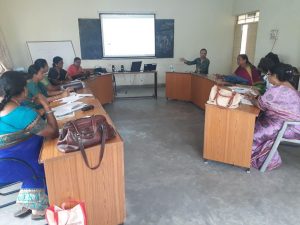
Capacity development of college faculty on ICT integration in teaching-learning
IT for Change conducted training sessions on ICT integration in teacher education for college teachers, as part of a faculty development program organized by the Teaching Learning Centre of Ramanujan College, University of Delhi, under the Ministry of Human Resource Development’s Pandit Madan Mohan Malaviya National Mission on Teachers and Teaching.
Curriculum
OER development in Indian languages
Open Educational Resources (OER) are seen by many educationists as an important way to provide high quality and inexpensive curricular resources to students and teachers. Unfortunately, most OER available today is in English. There is a need to develop OER in Indian languages. IT for Change’s approach to this has been to integrate the development of OER in Indian languages in its teacher development programs. IT for Change had the rare privilege of being invited by the Education Department of Telangana to help them develop an ICT student text book and teacher hand book for their higher primary and high schools. In 2017-18, we supported the translation of the text book and teacher hand book into Telugu by the core group of teachers, who were part of the development of these books in English. Telugu is the medium of instruction in most of the government schools in the state, and the translation makes the content accessible to many more students and teachers.
We also developed a software tool ‘Anagram’, which is derived from the K Anagram application. While K Anagram supports word jumbles in English, it does not support Indian languages which have the complexities of ‘Gunita’ (the addition of vowel sounds to consonants, such as ‘Ka’, ‘Ki’ etc.) and ‘Jodakshar’ (the combination of two letters, such as ‘Amma’). Anagram supports word jumbles in Devanagari, Kannada and Telugu scripts and can be used for supporting learning in local languages.
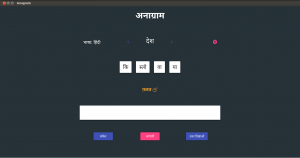
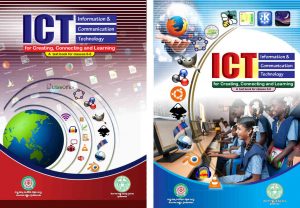
During the year, IT for Change worked with teachers to develop OER in Kannada and in Hindi as well. As part of working with the school leadership project with the Bruhat Bengaluru Municipal Corporation schools, resources were developed in Kannada and have been published on the Karnataka Open Educational Resources portal.
Other engagements
In November 2017, as a member of the Tamil Nadu ICT Syllabus review committee, IT for Change undertook a review of the ICT syllabus drafted by the syllabus committee of the department.
Blended learning programs (courses)
Working with student teachers of Vijaya Teachers College
IT for Change collaborated with Vijaya Teachers College to design a course on ‘Technology integrated learning’ for the student teachers of the Bachelors in Education (B.Ed.) program. The course is fully integrated into the two year B.Ed. program. The course design is aligned to the National ICT Curriculum developed by NCERT. In 2017-18, as part of the first two semesters, the course focused on building the capacities of the student teachers to integrate ICTs for their professional development. The course was offered in a blended mode, using the Moodle Learning Management System (LMS) to students, so that they could complement learning in the classroom sessions, with self and peer learning on the LMS. Subsequently, some faculty also used the LMS to support their own courses in the B.Ed. Program.
Working with teacher educators
IT for Change, in collaboration with Vijaya Teachers College, designed a program for teacher educators (B.Ed. faculty) in ICT and Education. The program, supported by IBM’s CSR division, consisted of an initiating workshop, where faculty learnt different digital methods and tools for professional development. This was followed by interactions and learning on the LMS, ending with a workshop which focused on strengthening the learning of faculty. The second workshop also exposed them to the larger issues relating to ICT and society, through select readings. For IT for Change, the blended learning program with student teachers and teacher educators was its first attempt at offering courses as an alternative to workshop based teacher development.
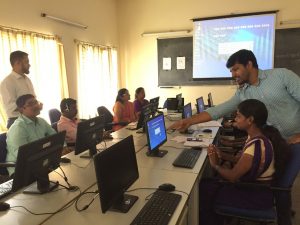
Education research and knowledge building
Book chapter on Open Educational Resources for Development
The global research network ‘Research on OER for Development’ (ROER4D) released a book on its research across Asia, South America and Africa in 2017. This book included a chapter, written by the IT for Change team, analyzing the action research done on the Subject Teacher Forum – Karnataka Open Educational Resources (STF-KOER) program in Karnataka.
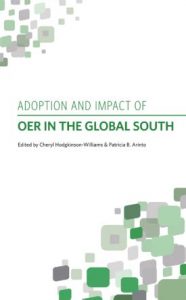
Open Educational Resources toolkit for Professional Learning Communities
The basic model of ICT integration that IT for Change has chosen in its work with the government school system is the building of ‘professional learning communities’ (PLCs) of teachers, who network for peer learning through sharing and seeking. An important aim of the network is the development of Open Educational Resources (OER). This model is in line with the themes of the NCERT ICT Curriculum – ‘Connecting and learning’ and ‘Creating and learning’.
IT for Change developed this model through its work in Karnataka and also introduced elements of the model in its work in Assam, Telangana and Andhra Pradesh. Based on these experiences this year, IT for Change developed a toolkit on ‘Development of a professional learning community approach for teacher development and OER creation”. This toolkit explains the Professional Learning Community (PLC) model of Teacher Professional Development, and is intended primarily for education administrators in different states of India, who can use it to explore this model for their own in-service teacher education programs.
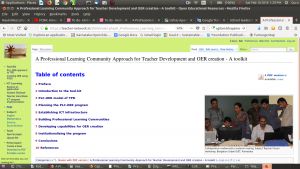
ICT implementation in school education in India
In collaboration with Tata Trusts, IT for Change developed a document providing a framework for implementing ICT integration in school education for India. The study aims to build a knowledge base on ICT program design and discusses ICT integration across five components – ICT infrastructure, school level implementation, teacher professional development curricular resource development and educational administration. Based on the recommended design, the report computes cost/ investment benchmarks for a program for integrating ICT in school education in India. The report has been provided to the National Education Policy team as an input on ICT integration.
Evaluation of the Prerana program
IT for Change conducted an evaluation of the Prerana program, of the NGO Sikshana, for Tata Trusts. The evaluation provided some insights and learning on the integration of ICT in school education and the use of incentives for students. The aim of participating in the evaluation of ICT in education programs of other organizations is to help build a knowledge base that would be useful to all organizations working in this area.
Paper presentations and publications
During 2017-18, we made a conscious attempt to document our experiences and learnings from our field projects, curriculum development and research work, and write and present papers in different conferences on ICT and Education, for a wider dissemination of our work. These included:
- Consultation on the National Education Policy 2017 (NEP), organized by the NEP secretariat. Our inputs emphasized the role of the participatory model of ICT integration in teacher education to strengthen and reform teacher education across the country.
- Two papers at the National Conference on ICT in School Education organized by the Regional Institute of Education (RIE), Ajmer in November 2017, on ‘A ‘Block’ community of learning approach to teacher professional development-Role of ICT’, and, ‘Role of teacher networks in the creation of Open Educational Resources’.
- Presentation on ‘Open street map’ at the Swatantra 2017 6th International Conference and Business Meet on Free Software and Free Knowledge, held in December 2017.
- Presentation at the Tata Institute of Social Science conference in February 2018 on ‘Collaborative knowledge creation: Interrogating processes and patterns’.
- Presentation on ‘Technology in education’, at the national seminar on ‘Quality assurance in higher education’, organized by the Centre for Educational and Social Studies in March 2018.
- Article on ‘Digital Storytelling, an ICT – based method of co-constructing and transacting curriculum’ for the ‘Voices of Teachers and Teacher Educators’ journal of the National Council of Education Research and Training, published in August 2017.
Plans for 2018-19
In the coming year, we will continue our work in Telangana to deepen and strengthen the Subject Teacher Forums and the TROER portal. We are also in discussions with the department of education in Rajasthan, to plan an ICT integrated teacher development program, on the lines of our work in Karnataka and Telangana. We will also deepen our school level demonstration project by extending it to government aided high schools in Bengaluru South district.
Recognizing that offering certificate courses for teachers and teacher educatorscan complement the workshop model of the STF program, IT for Change also plans to continue its collaboration with Vijaya Teachers College to offer courses based on National ICT Curriculum of CIET, NCERT, for student teachers and teacher educators of the Bachelors in Education program offered by teachers’ colleges in Bengaluru. In addition, IT for Change will collaborate with the Regional Institute of English, South India, and support them in offering their courses as blended learning programs, to allow greater teaching-learning opportunities for faculty and teachers.
We have been invited to participate in the ‘Teacher Professional Development@Scale’(TPD@Scale) global alliance for school quality improvement. The aim of the alliance, set up in 2018,is to help developing countries achieve the ‘Sustainable Development Goal 4’ (SDG4) on education.
